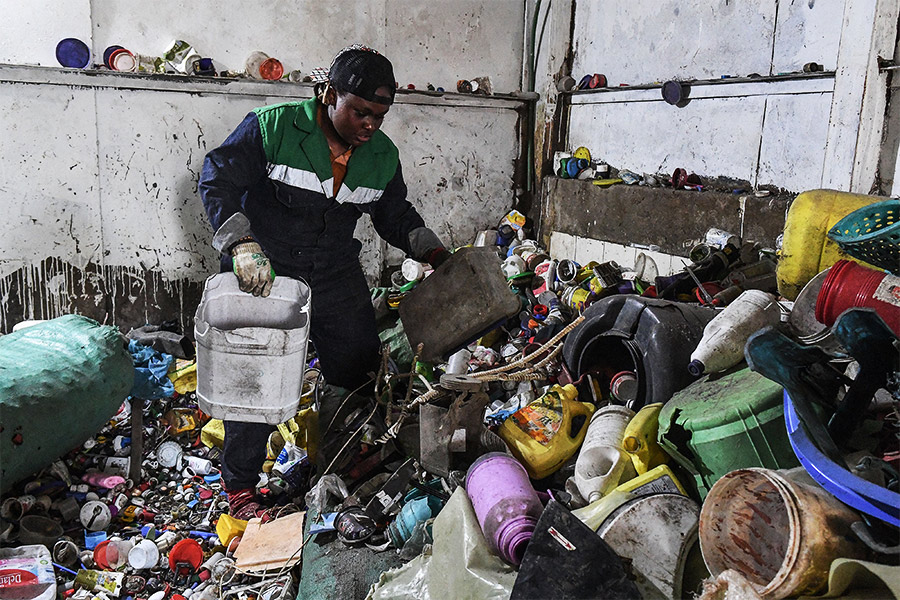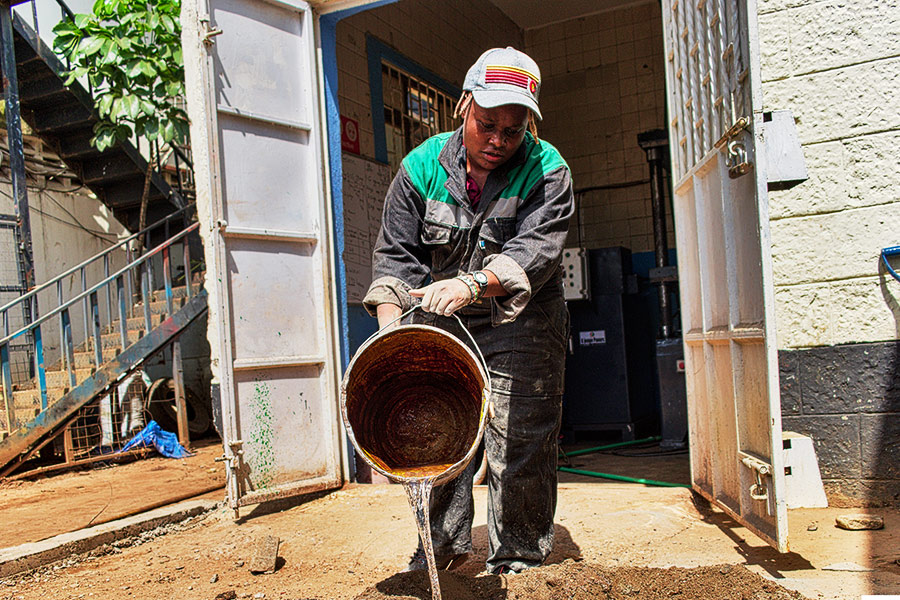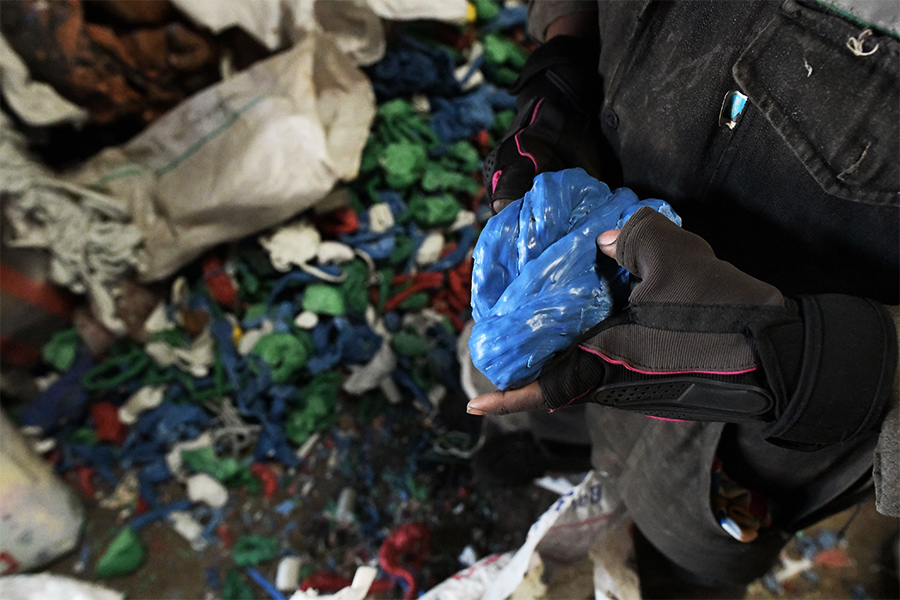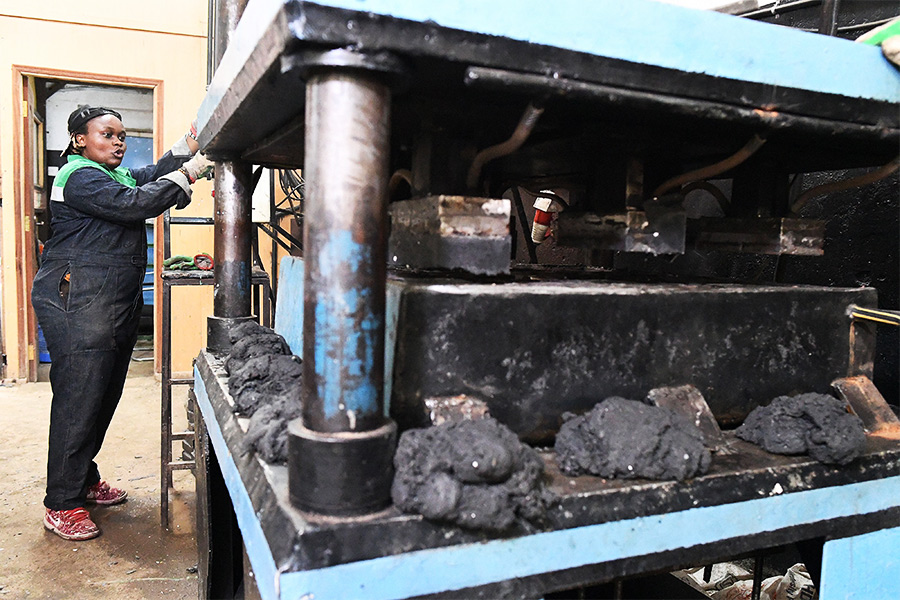Folk tales: Nzambi Matee
Kenya’s Nzambi Matee transforms plastic waste into durable, affordable building materials
“Research and development – RND – is key,” says Nzambi Matee, a 30-year-old entrepreneur from Nairobi. And she’d know. A fiercely intelligent firebrand with a background in physics and material sciences, Matee has been working to develop a solution to arguably the most intractable problem facing her home country – and, indeed, the world. The scourge of single-use plastic.

Matee sorts waste plastic material before recycling / Image: Getty Images

Flashback to five years ago. Nzambi Matee enjoyed a plum position as an analyst in Kenya’s lucrative oil industry. But she couldn’t escape the nagging feeling that something was amiss.
Her hometown of Nairobi had – and still very much has – a plastic waste problem. Some 500 metric tonnes of plastic waste is generated every single day in Nairobi alone. Only a small fraction of which is recycled. Much of the remainder, along with several hundred tonnes of plastic waste imported from elsewhere, winds up in Dandora, a landfill site that has been bursting at the seams for decades. It’s reckoned as many as 3,000 families scrape out a meagre living manually sifting through the Dandora landfill, creating horrifying intergenerational health problems. Not to mention the fact that mismanaged plastic waste is already choking rivers across the continent, devastating ecosystems and dramatically increasing the probability flash floods and infectious diseases.

Matee hard at work / Courtesy of Nzambi Matee

So in 2017, Nzambi Matee – appalled by the plastic trash she saw strewn everywhere – abruptly quit her job to set up a makeshift laboratory in her mother’s garden. The plan? Solving two of Kenya’s biggest issues – plastic waste, and a dearth of quality affordable shelter – at a stroke.
Matee worked tirelessly for about a year, putting on hold her lifelong passion for dance – “I love afrobeat, hiphop, dancehall and a bit of contemporary”, she tells us. She also spent all of her savings, and aggravated her mum’s neighbours with round the clock industrial noise. But eventually, in 2018, Matee was able to present her debut product – a humble block paver.
The core idea – making modular blocks like those you see on any typical pavement or driveway – is ingenious on several levels. Packaging companies around Nairobi pay good money to have their plastic waste removed and processed. Instead, Matee’s team collect it from them, for free. Then, back at Matee’s factory, this plastic is combined with sand and superheated, before being moulded into blocks.

One person's trash is another's treasure / Image: Getty Images

The blocks themselves, crafted from a precisely-calibrated blend of high-density polyethylene (often used for cosmetics bottles) with low-density polyethylene (plastic bags) and polypropylene (buckets, toys) come in an aesthetically pleasing range of colours. They’re stronger than traditional blocks, and less brittle. They’re also half the weight, so they’re cheaper to transport and easier to install. In a country where the quality of street surfaces can be patchy, this product should enjoy a ready market.
However, Matee initially struggled to get the right investment from government or local banks to expand her startup. Characteristically, instead of sitting back and complaining, she did her homework and found a scholarship to attend a social entrepreneurship training programme in the United States. Flying over with her sample blocks in her luggage, she impressed the team at the University of Colorado, Boulder, and before long attacked the attention of the United Nations Environment Programme (UNEP). Which later provided seed funding to help Matee return home in triumph and finally get her business, Gjenge Makers, off the ground.
After launching in 2020 – with not inconsiderable task of Matee designing and fabricating the factory machinery essentially from scratch – Gjenge Makers today provides a stable income for well over 100 people, producing more than 1,500 blocks a day. The company is proudly considered to be at the forefront of sustainable industry in Africa.

Matee controls a presser at Gjenge workshop / Image: Getty Images

So what’s next for Matee and Gjenge Makers?
“The opportunities are enormous,” beams Matee. “We are currently planning to expand. We’re in talks with companies from three other African countries – Nigeria, Sierra Leone and South Africa – who want to replicate what we do. And that’s just to start with.”
Matee’s ambition goes far beyond block paving, with future projects intending to tackle Kenya’s housing problems, and even working with the agricultural sector to create more sustainable solutions in that market.
“Our company goal is to be a leader in alternative building products,” she says. “We’re currently working on plastic lumber made from high density polyethylene (HDPE) and polypropylene (PP). Right now we’re in the research and development stage of building new kinds of pigsty, and even beehives.”
Well that’s one way to create a buzz.